Interview With Michael Simpson (Ravenstone - 2002)
|
In
an exclusive interview, Director Michael Simpson speaks at length
for the first time in 30 years about Ravenstone and the Ravenstone/Sleepaway
Camp connection.
Because of the interest sparked
by Ravenstone's song "More Love" which is a bonus on the
Unhappy Campers DVD, sleepawaycampfilms.com thought it would be
interesting to talk the film's director, Michael Simpson about just
his music - which he has touched on a little in past interviews.
He agreed to speak about the band, the early days of the internationally
known Athens music scene and his own music background. Prior to
the interview, I was given some press information and photos which
can be found here.
Sleepaway Camp Films: Most
campers only know you through your movies. It'll probably come as
a surprise to them to learn you had a career in music before you
became a movie director.
Michael A. Simpson: I played professionally
for ten years. I started in a garage band when I was 14. Early on,
we used to play at the Enlisted Men's Club at Fort Gillem. That's
an Army Base on the outskirts of Forest Park where I grew up in
Georgia. None of the guys in the band was old enough to drive so
my dad drove us to the club and then picked us up when we finished
playing.
SCF: That's
too funny.
Simpson:
Since we were
minors working in a bar, the club manager wouldn't let us off the
stage without an escort. The waitress even had to walk you to the
toilet. She'd wait at the door while you made your offering to the
porcelain gods then she'd walk you back. You can imagine the kidding
we took for that from the soldiers in the bar but they seemed to
like our music.
SCF:
Let's
talk about Athens, Georgia, in the early 70s when Ravenstone was
formed. Since the city later became an internationally recognized
music scene, I think a lot of people are interested in how it all
began.
Simpson:
The Athens music
scene was embryonic in the early 70s. It was nothing like it became
after the B-52s, then R.E.M., put Athens on the map a few
years later. And of course, after that, Widespread Panic also came
out of Athens.
SCF:
That's
an incredible roster of bands to come out of such a small city.
Simpson:
There are several
other world-class bands that came out of that scene over the years.
Early on though, there were only a handful of bands from Athens
and clubs to play in.
SCF:
Ravenstone
was performing its own original music in Athens in '71. The band
predates the B-52's by what, five years or so?
Simpson:
Yeah, something
like that.
SCF:
You
guys are really like the godfathers of Athens music in a way then.
Simpson:
(laughs) Or
maybe the bastard Uncle or something.
SCF:
How
did Ravenstone start?
Simpson:
I was attending the University of Georgia in Athens where I was
studying film. Butch Blasingame, Bill Wilson and I were in a drama
class. I'd met Bill a few months earlier and had jammed with him
and really liked his drumming. He had a lot of jazz and big band
influences, which was rare for a rock drummer. Butch was a lead
guitarist and he recruited Dwight Brown, the bass player, and Ralph
Towler, who played guitar and keyboards. The three of them had previously
played together in a group from Monroe, Georgia, which is about
30 miles outside of Athens.
SCF:
You
were the lead vocalist of Ravenstone. One press clipping described
you as "nubile."
Simpson:
Yeah, I spent
years living that one down. (laughs)
SCF:
Tell
me about the band's name. Charlie Burel's article said Ravenstone
was the name of a field in Germany where they executed witches during
the 15th Century.
Simpson:
It's mentioned
in the play "Faust" by Goethe. The scene is set at night
in an open field. It begins -- "What weaving are they round
the Ravenstone? Mephistopheles. I know not what they are..."
SCF:
That's
a pretty literate name for a rock band. Why'd you choose it?
Simpson:
We were studying
the play in class. It seemed like an apt metaphor.
SCF:
A
metaphor? For what?
Simpson:
Being young
and full of ourselves, we had lots of passion and idealism. Basically,
we wanted to slay the prejudices we saw around us or some such nonsense.
SCF:
Do
you remember Ravenstone's first performance?
Simpson:
It was for a
birthday party in this large, old southern gothic mansion on Milledge
Ave. About fifty people were there. At one time a sorority had rented
the house so we called it the Eata Theta Pi gig. Pretty juvenile
humor.
SCF:
From
the very beginning, you guys were into politics in a big way.
Simpson:
It was at the
height of the Vietnam War. We opposed the war and did what we could
to help stop it. As a band we were also involved in things like
voter registration, freedom of expression and human rights issues,
campus politics. And some basic hell raising. Lots of that, actually.
SCF:
The
article written by Rex Granum in the Atlanta Journal & Constitution
newspaper, "Five Set Politics to Music," stated that Ravenstone
was forming a student political party at the University of Georgia.
This was November '71.
Simpson:
The band rented
a large house on Prince Avenue where we lived and also rehearsed.
Rex showed up there for an interview. I think he was intrigued by
the idea that a bunch of long haired musicians could actually make
a complete sentence. Rex later served in the Carter White House.
SCF:
The
article mentioned you guys flew an American flag in front of the
band house. What was that about?
Simpson:
At the time,
there were people who thought you couldn't have long hair or oppose
the war and still be patriotic and love your country. Bill, our
drummer, suggested we put the flag up to show you could. We considered
ourselves patriotic. We just disagreed with the direction the country
was heading. At that time, a lot of folks did.
SCF:
The
AJ&C had the largest circulation of any newspaper in the southeastern
U. S. and the Ravenstone article ran on Thanksgiving Day, their
largest print day. Lots of people must have read that story.
Simpson:
Yeah, someone
once estimated that more than a million people read that article.
SCF:
Ravenstone
had only been a band a few months. Yet, you already had enough notoriety
to have a write up about the band in a major newspaper. That's pretty
amazing, really.
Simpson:
There weren't
many bands playing their own music from Athens at the time, especially
ones who had something more to say other than "let's boogie,"
so we quickly developed a following. Ravenstone was able to fill
up some of the early Athens clubs like the Hedges, Fifth Quarter
or Mother's Moustache where they'd pretty much let us play anything
we wanted as long as people showed up and drank beer. We also did
some concerts early on, on campus at the student center and Legion
Field, which got us exposure.
SCF:
Your
first concert at Legion Field sounded wild, I'm told.
Simpson:
Legion Field
is at the bottom of a long, slopping hill that has several large
dorms stacked up the side of it. The students in the dorms spilled
out to hear us play. We rented part of the P.A. system that was
used at the first Atlanta International Pop Festival. It was huge.
We were told that you could hear us all the way to Little Five Points
several miles away.
SCF:
I
read your music was responsible for some unintended pregnancies
that night.
Simpson:
(laughs) That's
an urban legend that seems to have taken on a life of its own. A
couple got caught getting their freak on in some bushes or something
during the concert. That's how the story got started.
SCF:
How
did the band's politics evolve?
Simpson:
The idea was
to start a campus political party called Ravenstone Coalition. After
the AJ&C article ran, I met Chuck Searcy, a Vietnam vet. Chuck's
one of the most honorable people I've ever known. Like many Nam
vets, he came home disillusioned with the war. He helped to start
the University's V VAW chapter.
SCF:
V
VAW?
Simpson: Vietnam
Veterans Against the War. Chuck introduced me to another student and the
three of us agreed to form the political party. Dwight Brown, our bass
player, went with me to the first meeting that was held at Chuck's house
in Little Five Points in Athens. There were about 20 students there.
SCF:
Why
were you guys so interested in student politics?
Simpson:
Basically
we wanted to shift the paradigm.
SCF:
Shift
it? In what way?
Simpson:
Up
until that time, student government was controlled by two factions --
white bread fraternities and sororities that voted as a block and a south
campus faction that was dominated by conservatives whose idea of a good
time was sticking their fist up a cow's ass. Both groups were so Neanderthal
they wouldn't even nominate a woman to run for any executive office other
than secretary.
SCF:
You
gotta be kiddin'.
Simpson:
Coalition
was different. We encouraged everyone to participate in the party. We
had minorities, international students, Gays, Lesbians, feminists, Vietnam
vets, hippies, vegans, physically challenged students, you name it. It
was like Noah's Ark. We had two of everything.
SCF:
Were
you successful?
Simpson:
Coalition's
first campaign resulted in a woman being elected vice president of student
government. The following year we won control of the student senate.
SCF:
This
is like a southern version of Wild In The Streets.
Simpson:
Almost
overnight, student government went from being a social organization to
actually dealing with issues important to students. We passed a no confidence
vote in the University President who was unpopular. That caused a political
dust up state-wide. We were invited to meet with then Governor Jimmy Carter
to discuss the problem. Carter told us during the meeting that he planned
to run for President.
SCF:
Now
there's a man who had a vision of where he was going.
Simpson:
President
Carter is one of the smartest and most honest Presidents our country has
ever had. Even his detractors admit he's been our best ex-President. I
was privileged to attend his Inaugural in 1976. I also interviewed him
a few years later when I was producing and directing the "Portrait
of America" series for Turner Broadcasting.
SCF:
I
guess the moral about Ravenstone and the Coalition Party is political
activism can make a difference.
Simpson:
Absolutely.
Once we were elected, another thing Coalition did was to invite Tom Hayden
and Jane Fonda to speak on campus, which really put a burr in the saddle
of some campus conservatives. I was asked to be Jane's photographer for
the day and got to spend the afternoon with her. She was one of the most
beautiful women I'd ever seen. I had schoolboy visions of Barbarella in
my head for days.
SCF:
I
noticed on Coalition's political platform your support for funding of
the University radio station.
Simpson:
Yes.
We supported the feasibility study for the radio station that became WUOG.
SCF:
WUOG
is credited with helping to break the Athens music scene by showcasing
the emerging bands in it.
Simpson:
I
think you could say that WUOG was a factor.
SCF:
Ravenstone
really impacted the music scene in Athens, then, both through its music
and through its politics and its support for the campus radio station.
Simpson:
The
main thing we did was have lots of fun. It's like that line from the song
by Commander Cody & His Lost Planet Airmen -- "There's one thing
I've never done, I've never had too much fun!"
SCF:
During
this time you were elected a student senator. You also regularly wrote
an editorial column for the campus newspaper and another one for a city
paper.
Simpson:
Yes,
The Athens Observer.
SCF:
Geez,
when did you find the time to go to class?
Simpson:
If
you saw some of my grades it was pretty apparent I didn't. (laughs) I
spent most of my time making student films, playing music and rabble rousing.
|
|
Media
Click For Full






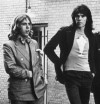


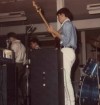
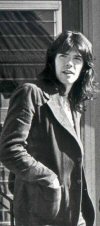
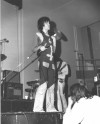


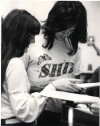

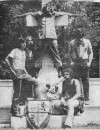


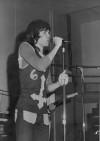






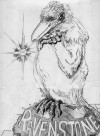
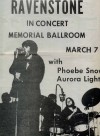

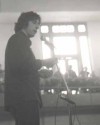

|
SCF:
I
noticed during that period Rex Murphy, the Pulitzer prize-winning Editor
of the Atlanta Constitution, quoted you in the lead of an editorial he
wrote in that paper. Something you had said about student apathy.
Simpson:
It
must have been an awfully slow news day. (laughs) Actually, I felt it
was important when all this was going on not to take myself too seriously.
That would've killed it.
SCF:
One
of my favorite photos of you is the one where you appear to be signing
an autograph or something and you have a tee shirt on that reads S-H-I-T.
Simpson:
That
was my Sam Houston Institute of Technology tee shirt. (laughs)
SCF:
Yeah,
right.
Simpson:
These
days when you have performers stapling their balls to their leg on stage,
a shirt like that is no big deal. But back in the day, it caused a ruckus
when I wore it during a performance on campus and some prom queen complained
to the administration that she found it obscene.
For
me, it was a freedom of expression issue. I asked the Dean of Student
Affairs how do you know it doesn't stand for Sam Houston Institute of
Technology?
The
silliest part was after the brouhaha the editors wanted to put the photo
in the campus year book only they had to get permission from the administration
to do it. After some debate, the Dean allowed them to put it in. It ran
as a full page that year so I guess I had the last laugh.
SCF:
I
also found this letter very interesting.
Simpson:
Which
one?
SCF:
The
one printed in a newspaper and signed by the band with the headline "Sweet
Cream."
Simpson:
There
had been a rape on campus the same night as some reverend held a prayer
vigil in front of Effie's, the local house of prostitution, trying to
shut it down. The articles ran side by side on the front page of the paper.
It seemed sadly ironic so we wrote this letter and quoted "Sweet
Cream Ladies," a song by the Alex Chilton and the Box Tops.
"Sweet
cream ladies forward march,
think what you're providing,
sweet cream ladies show your starch,
what's the use of hiding,
tell the socialites to look the other way,
it's instinctive stimulation you convey,
it's a necessary compunction,
for those who get tired of vanilla every day!"
SCF:
The
earliest reviews of the band noted Ravenstone's original music. Most groups
don't start writing their own music right out of the gate like that.
Simpson:
Although
we did some cover songs, early on, Ravenstone was really all about our
own music.
SCF:
One
critic called your original tunes "tasty."
Simpson:
Sounds
like he was doing a restaurant review.
SCF:
Likened
to Fast Food! (laughs) The band's music was also described as "earotic
rock." I loved the spelling. How did that description come about?
Simpson:
I
think it came from me humping a microphone stand one night in concert
or something.
SCF:
Tell
me about the Liberation Dance, which one article described as the first
openly gay dance in the southeast. That got a lot of press coverage when
the band headlined the event.
Simpson:
Some
gay students wanted to hold a dance in the Memorial Hall Ballroom on campus
and have Diamond Lil, a female impersonator, perform, but permission was
revoked by the Dean of Student Affairs on the grounds that the University
could be charged with aiding and abetting a felony -- sodomy.
SCF:
It
sounds like the Dean thought the students were going to have an orgy not
a dance.
Simpson:
The
students took the case to court. It ended up in Clark County Superior
Court, which was the same court that two years before had refused to protect
peaceful black and white civil rights marchers from clubbings by police
and mass arrests.
SCF:
What
happened?
Simpson:
When
the Dean testified the defense lawyers cut him up like bait in a tackle
shop. The judge reluctantly issued an order forcing the University to
allow the dance at 5pm the day of the event.
SCF:
I
understand that other bands were asked to play and refused. You guys weren't
afraid to get involved in such a volatile situation?
Simpson:
The
committee sponsoring the dance asked us if we'd perform. They were trying
to broaden student attendance to the event beyond the gay and lesbian
community. We were warned that there could be trouble at the dance but
for us it was a human rights issue. So we headlined the bill with Diamond
Lil who put on a great show. As I recall, we donated our fee back to the
committee to help pay for their legal costs so we performed for free.
SCF:
This
was the dance where the band was harassed by the Klan?
Simpson:
That
night, just before we performed, an older white man came up and said the
Klan was unhappy about the dance and we should watch ourselves if we knew
what was good for us. Some silly shit like that. He then said that they
knew where we lived. I think at the time I sort of laughed it off. Then
he described the car my girlfriend was driving. It didn't seem as funny
then. After the concert, we went outside to discover that the event security
had curiously disappeared early. We found a card from the Klan on the
windshield of our bus.
SCF:
A
card?
Simpson:
A
printed card with the Klan symbol on it. It was their way of trying to
intimidate us. I remember Jimmy Ellison, our roadie, got kind of spooked
about it. He was from a place in Georgia where the Klan still painted
their symbol across the roads at the county line. Ralph kept the card
as a souvenir. He still has it.
SCF:
The
photo of you on-stage wearing a shirt with the letters 666 on it. When
was that taken?
Simpson:
A
concert at Memorial Hall in '71.
SCF:
Some
people claim that's the numerical name of the Anti-Christ...
Simpson:
I
know that 666 and the whole "mark of the beast" thing became
synonymous with metal bands later on. However, when I did it in the early
70s it was really more about making a statement about the difference between
religion and spirituality.
SCF:
What's
the difference?
Simpson:
For
me, religion is essentially symbols and dogmas created by man and that
much of the world's strife is a result of the fanaticism attached to those
artifacts and belief systems. That's my personal opinion. I'm not speaking
for the band.
Spirituality,
on the other hand is, for me, about Kirkegaard's "Leap of Faith."
Communing with the Unknowable.
SCF:
The
Unknowable?
Simpson:
The
Universal Creator that I sense as being both a noun and a verb. In other
words, an on-going, active experience.
SCF:
I
notice you don't use the word "God."
Simpson:
It's
an overused and under appreciated word, one that's often linked with disparate
man-made symbols and dogmas in many people's minds. However, you can use
it if you wish.
SCF:
How
does this relate to the number 666?
Simpson:
The
point I was making at the time is that the number 666 is just that, a
number. A man-made symbol. It has no power unless you give it power. There
were 666 soldiers in a Roman Legion, which is where the number originally
comes from, and I believe that's actually the meaning of the reference
found in Biblical Revelations. Anything else about the number is just
something some person later injected or infused into it. I actually have
a cell phone number with 666 as the prefix. I'm sure some people would
get all goosey about that but it doesn't bother me in the least.
SCF:
The
shirt in the photo also had an upside down cross, which some people associate
with Satanism.
Simpson:
That's
another good example of how a symbol can mean different things to different
people. In Christian tradition, one of the disciples, Peter, asked to
be crucified upside down because he felt unworthy to be crucified in the
same manner as Christ. In that tradition, the upside down cross is an
apostolic symbol representing Peter as the holder of the keys of Heaven.
So you can see, again, it depends on your point of view and what power
you decide to give the symbol.
SCF:
I
was impressed by the musical influences for Ravenstone mentioned in Burel's
article. They weren't the usual ones for bands from the southeastern U.S.
during that time.
Simpson:
Yeah,
we enjoyed covering songs by some of those groups.
SCF:
I
hear you used to do a killer impersonation of Mick Jagger.
Simpson:
(laughs)
We all liked Stones music, especially the "Exile on Main Street"
album, but we didn't want to just play the same songs every bar band played.
So we covered songs like "Midnight Rambler," "Gimme Shelter,"
and "Street Fighting Man." It sort of got out of hand. People
were showing up at our performances hoping we'd do the Stones songs. Even
though we were doing them as a lark, some people who didn't get the joke
thought I wanted to be Mick Jagger and didn't know that in fact the job
had been taken.
SCF:
From
what I read, the original line up of Ravenstone broke up acrimoniously
just as you were on the cusp of really doing something with your music.
You guys had gone into the studio to record your first album. What happened?
Simpson:
We
were five young, very head strong and passionate people so there was always
a lot of turmoil between us. Ralph once said that any day the five of
us could get in a room without some of us ending up wrestling around on
the floor was a good day. (laughs) It was never really that bad but at
times I'm sure it seemed like it. But creative tension isn't necessarily
a bad thing.
SCF:
When
the original version of the group disbanded, who left?
Simpson:
Bill
and Ralph exited, then Dwight followed a year later. Butch and I continued
the group with various other musicians until '74. But the creative energy
dissipated after Bill, Ralph and Dwight left. It was never the same, really.
I mean, we played with some other great musicians, like Greg Veale, Randy
Delay, there were several others. But we lost the creative spark and originality
that marked the first edition of the group. It became just about gigs
and money. No passion or originality.
SCF:
Let's
talk about the group today. The original band members are recording a
CD and plan to perform live again?
Simpson:
We
decided to get together and jam a bit at Towler Farm in Monroe just to
see how it felt. We ended writing about 20 songs in five days. We recorded
two of the tracks, "More Love" and "Boomer," essentially
live in the studio just to see if we still had enough chops not to embarrass
ourselves. Some copies were made to share with friends and people started
passing them around and the next thing we knew, we were getting calls
asking us to perform.
SCF:
I've
heard "More Love" and "Boomer." I couldn't get the
hook of "More Love" out of my brain for days after I first heard
it.
Simpson:
We
call Butcho the "riff master." That's one of his hooks.
SCF:
There's
an almost spiritual quality to the lyrics of "More Love." Is
it accurate to say the band has a spiritual bent?
Simpson:
There's
always been a spiritual side to the band although, believe me, we can
also be pretty rowdy when we get in the right mood.
SCF:
And
you originally considered "More Love" for Unhappy Campers?
Simpson:
I
was looking for a song for the closing credits that would say, don't take
this horror stuff too seriously. We don't really need more of that. What
we really need is more love. I had the lyrics worked out in my head. But
I decided to go in a different direction so the song was never finished.
We used the lyric idea when Ravenstone got together again.
SCF:
I
also noticed during the Behind-The-Scenes Footage on Unhappy Campers and
Teenage Wasteland that some isolated Ravenstone music plays as a soundtrack.
Simpson:
That's
correct. Good ear.
SCF:
In
the lyrics to "Boomer," you take a generation to task in a pretty
humorous way. I love the line - "we were gonna change the world,
and now we find, it's hard just to change our minds!"
Simpson:
The
boomer generation has been a disappointment, I believe. We started out
with such passion and conviction. Now the only passion we have is for
our SUVs and 401(k)'s.
SCF:
Is
that a mandolin I hear in "Boomer?"
Simpson:
Ralph
decided to throw that in when we were in the studio. It was a great idea
I thought. I love Ralph's work. He always brings something interesting
to our music. All the guys do, really. That's why it works.
SCF:
Who
is on vocals?
Simpson:
Dwight,
who we call "smooth touch," Ralph and myself on "Boomer."
Dwight and I are on "More Love." We did the vocals on both songs
in one take.
SCF:
The
CD single is a limited edition, then?
Simpson:
Yeah.
We plan to include versions of "More Love" and "Boomer"
on a five song EP that should come out in early 2003.
SCF:
The
band members are spread out in five different states now. How do you rehearse
and record?
Simpson:
Butcho
is a tech wizard so he guided the band in finding the right hardware and
software so we can create and exchange musical ideas over the net. Then
we get together at Towler Farm to rehearse. We hope to finish a full length
CD sometime next year and when we do, we've agreed to play a few dates
just for the fun of it.
SCF:
What's
the band's writing process like? Is there one set way you guys write material?
Simpson:
All
of us have ideas and contribute and we all share credit equally on the
songs. It was a decision we made back in the 70s when we originally played
together. I tend to do the lyrics and sometimes I come up with a melody
that I pass along to one of the guys. Sometimes Butch comes up with these
insanely addictive guitar licks that he passes along to me to do lyrics.
Dwight, Ralph and Bill also come up with great song ideas that they pass
around. But we don't consider anything to be a rave song until all five
of us sign off on it and contribute to it.
SCF:
Your
logo, the raven on a rock. Great design.
Simpson:
That
was taken from a poster for one of our performances back in the 70s. We
decided to keep it. It just felt right for a bunch of middle-aged rockers
to have an old, fat bird as a logo. (laughs)
SCF:
I
understand that this is the first time you spoken at length about Ravenstone
since the 70s.
Simpson:
It
was a door I walked out of with the intention of never walking back through.
SCF:
What
made you change your mind?
Simpson:
We're
at points in our lives where we're all interested in playing together
again. The five of us are remarkably close friends. We're like brothers
in a way. When I was asked if I was interested, I said I'd only do it
if the five original members were interested and I would only continue
to do it for as long as we all stayed interested and it was fun.
SCF:
The
band always seemed to be about more than just your music. What do you
think your message is today?
Simpson:
(laughs)
Probably that you're never too old to get up and shake your booty. There'll
be plenty of time to lie down when you're dead. That sounds like a lyric
idea for a song (sings) - the dead can't dance but you can...
Thanks
Michael, for plundering the rich tapestry of your past. I'm sure intelligent
horror fans all over the world are grateful to see a whole other side
of a slasher director.
|

